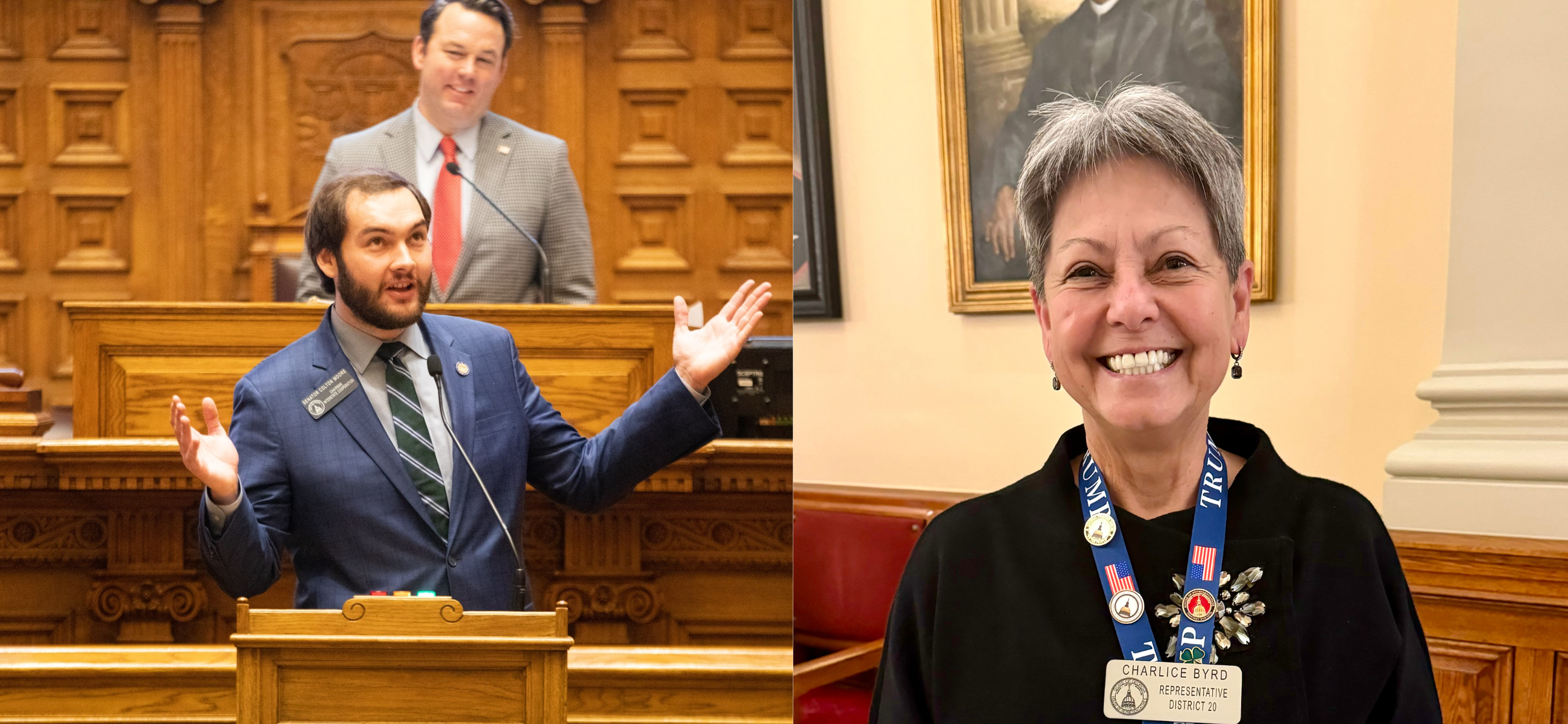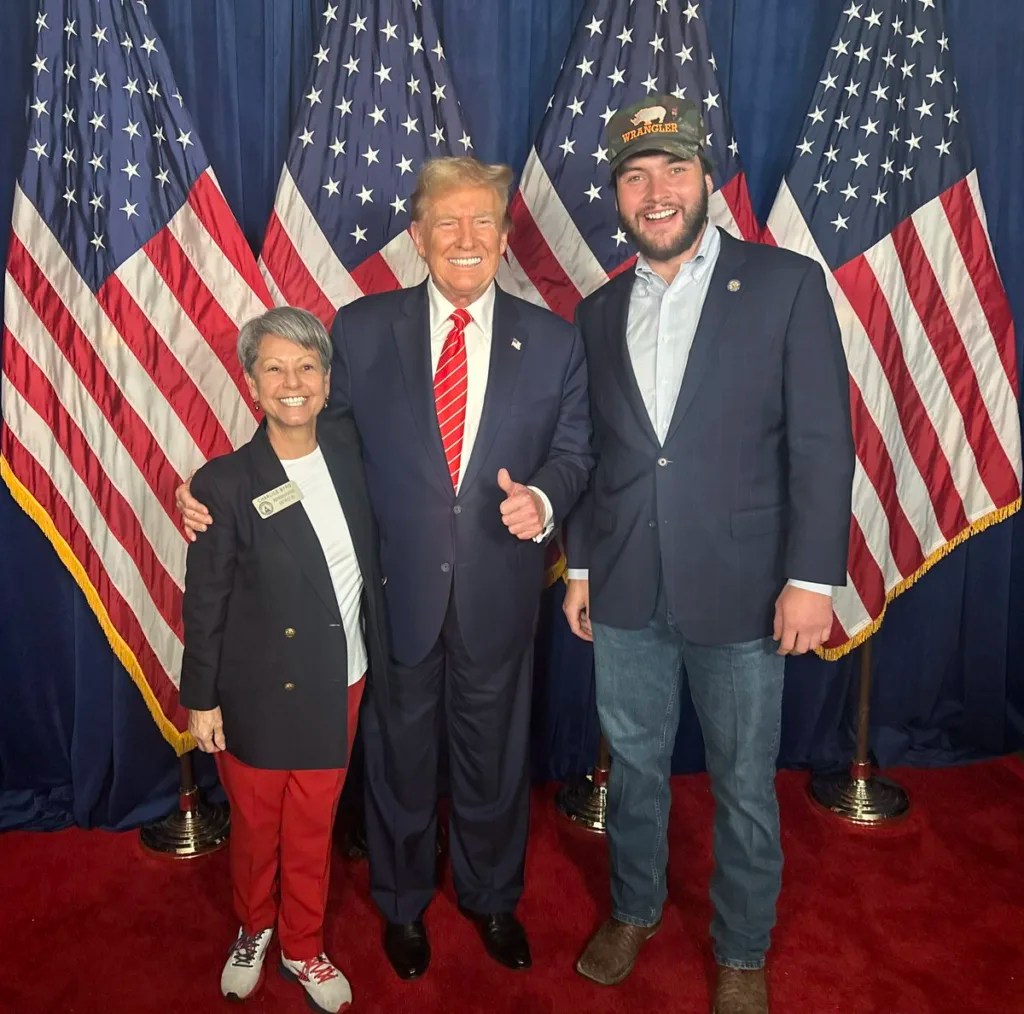Stay ahead of the curve as a political insider with deep policy analysis, daily briefings and policy-shaping tools.
Request a DemoVoting ‘no’ is a legislative way of life for these two Georgia lawmakers

Sen. Colton Moore, left, and Rep. Charlice Byrd. (Credit: Georgia Senate/Jill Jordan Sieder)
ATLANTA — When it comes to voting “no,” Rep. Charlice Byrd and Sen. Colton Moore are the top two naysayers in the Georgia General Assembly.
The two conservative, Republican lawmakers have been in lockstep on several key pieces of legislation throughout the session. Between them, they’ve voted no on nearly 200 bills, often casting the lone dissenting vote. Each was the only lawmaker in their chamber, for instance, to vote no on the state’s fiscal year 2025 budget.
In fact, the two legislators have voted in unison on a number of bills this session that will impact Georgians in substantial ways. They’ve voted no on bills that would:
- Ease restrictions on expanding hospitals.
- Double parental leave for state employees to six weeks from three weeks.
- Forgive the student loans of mental health workers and veterinarians.
- Let nurses and physician assistants prescribe painkillers to patients.
- Require employers to provide secret ballot votes if their workers choose to unionize. Companies that do so get state economic incentives.
- Create a new program to provide housing and services for the homeless.
- Require convenience stores to post information from the human trafficking hotline.
All of those bills passed despite Moore and Byrd’s votes.
They don’t always go against the grain of their party, which controls both the state House and Senate as well as the offices of the governor, secretary of state and attorney general — known as the Republican trifecta.
Moore and Byrd have given a nod to some key Republican initiatives this year, including bills to support private school vouchers, enforce the tracking and detention of undocumented immigrants, ban foreigners from donating to political campaigns, and to ensure that legislation takes into account the impact on small businesses. They’ve joined the GOP on election reform measures removing the secretary of state from the State Election Board and making changes to ballots and voting procedures designed to improve election security. And both agree that people who don’t have cosmetology licenses should be allowed to blow-dry hair and apply makeup.
The pair’s far-right views are heavily influenced by the Georgia Freedom Caucus, a three-year-old, uber-conservative group that is the outgrowth of the congressional House Freedom Caucus. The national State Freedom Caucus Network favors social conservatism and small government and opposes immigration reform. It helped oust U.S. House Speaker Kevin McCarthy last fall.
Byrd and Moore are chair and vice chair, respectively, of the Georgia group. Sen. Greg Dolezal, R-Cumming, the chief deputy majority whip in the Senate, is the third member of the Freedom Caucus in the General Assembly.
“I go by the four pillars of my Georgia Freedom Caucus,” which are, “Does it grow government? Does it raise taxes? Does it increase regulation? And does it go against personal liberties?” Byrd said on Georgia Public Broadcasting’s “Lawmakers” television show earlier this month when asked about her pattern of no votes. “I also throw in there for myself: Is it the proper role of government? … It was to protect, preserve and defend, and now we fund a whole lot of things that we really should not be funding.”
Byrd and Moore began the session in January promoting the Freedom Caucus proposal for a complete repeal of the state income tax by 2030, and belittling the gradual personal income tax drop of 0.1% per year to 4.99% from 5.49% by 2029 promoted by the governor and GOP leadership. “At that rate, it would take 54 years to get to zero,” said Moore.
Both Byrd and Moore are rabid supporters of former president Donald Trump. And both have caught flak for controversial moves in the Legislature.

Moore has burned up considerable political capital — and gained national attention doing so. He was kicked out of the Senate Republican caucus last September after attacking fellow Republicans for refusing to agree with him in calling for a special session to take action against Fulton County District Attorney Fani Willis, who is prosecuting Trump in an election interference trial. Earlier this month, Moore was banned indefinitely from the House for a scathing tirade he leveled against the late-Speaker of the House David Ralston.
The self-styled “RINO (Republican In Name Only) Wranglers” were featured in this video calling for a special session and lambasting their GOP colleagues:

Byrd introduced a bill early this year to impeach Willis, but it was ignored in the House. Later in the session, Republicans in both chambers went after Willis and others they deem as “rogue prosecutors” in their own way, by standing up a prosecutorial oversight commission (a bill which Byrd and Moore voted against). The Senate, led by Dolezal, also launched an investigative committee to probe Willis’ conduct, which Moore supported and claimed credit for spurring on.
The pair’s unconventional approach is “not the normal path that one follows when trying to build a successful career in the Legislature,” Charles Bullock, a University of Georgia political science professor who is widely-regarded as a preeminent scholar on Southern politics, told State Affairs.
“The old advice that [former] U.S. House Speaker Sam Rayburn used to give new members is ‘you have to go along to get along,’ ” said Bullock. “Help out other members and when you need help, you could turn to your colleagues and they’ll remember when you were helpful to them and they’ll reciprocate. If you’re out there burning bridges though, it means you are going to be less effective in doing things for your constituents.”
Byrd against immigrant ‘invasion and for the free market
Byrd, 72, is a former middle school teacher and political activist who lives in Woodstock and represents conservative, wealthy and mostly white Cherokee County. A self-described “pro-fair tax, pro-gun, pro-life Reagan conservative,” she has consistently voted for measures that return funds to taxpayers and against those that expand the budget.
She said the amended fiscal year 2024 budget signed by Gov. Brian Kemp this month “is full of crony subsidies, welfare and woke-ism while failing to deliver on conservative policies.”
Byrd said she took issue with spending $126 million on Kemp’s limited expansion of Medicaid through his Pathways program, despite its requirement for recipients to work or volunteer. And she’s opposed to “paying to grow the EV (electric vehicle) industry, train their workers, house their workers, subsidize them to the max. Free market should decide if EVs are our future, not the government.”
Byrd was also against returning $66 million to the University System of Georgia (USG) for teaching expenses, a line item in the 2024 budget vetoed by the governor last year. “Our universities are indoctrinating our kids … and USG is funding racism, sexism and radical gender ideology,” said Byrd.
Of Chinese and European descent, Byrd is a founding member of the Asian-American Pacific Islander Caucus in the General Assembly. Unlike other members of the mostly Democratic caucus, she regularly complains about “the invasion” of illegal immigrants in Georgia and at the southern U.S. border.
Last month she said, “Georgia is doling out our taxpayer dollars for everything that is not the proper role of government while doing nothing to address the invasion of our state or the root causes of sex trafficking or holding Fani Willis accountable. With the Republican trifecta, one would think we should be doing a lot better.”
Through March 21 of this session, Byrd has voted no 118 times out of 325 votes on legislation, or 36% of the time.
On Monday she posted this video on X to brag about being “the state representative who votes ‘no’ the most,” and to preview the last two legislative days of the session, which she said “will be dangerous for freedom”:
Among Byrd’s solo no votes this year was a vote against allowing people who make cottage foods such as baked goods, jams and trail mixes in their homes to sell them in local stores. She was also alone in rejecting a bill to create the Weeping Time Cultural Heritage Authority to preserve the memory of more than 400 African slaves sold in Savannah in 1859.
Byrd acknowledged it can be tough to vote against everyone in her party and sometimes against the entire House.
“You lose a lot of friends, and that is very unfortunate,” she said. “I have made a lot of other friends that appreciate and respect what I do,” including some colleagues who tell her they wish they could vote the way she does. “And I always tell them, ‘There is not one person on that floor that votes for you. It is your district that votes for you, and you should be voting your district.’ ”
Even when she’s voting with the majority, she finds moments to work in her far right agenda. During a long debate this week in the House over Senate Bill 354, a bill to allow blow-dry stylists and makeup artists to practice without a cosmetology license, which several Democrats warned would pose health risks, Byrd said, “we should be more concerned about a doctor mutilating our children than the licensing of cosmetology.”
Moore pushing for criminal justice reform
In his first month at work in the Legislature this year, Moore voted no on a dozen of the 45 or so bills that came up for a vote in the Senate.
The legislation Moore has voted against runs the gamut. He was the sole naysayer on a resolution that would create a Senate study committee to look at improving family caregiver services. He also was the single no vote on a resolution that designates May 1 as Purebred Dog Day. Both passed the Senate.
He was one of six lawmakers who voted no on a bill that defines antisemitism. That bill passed 44-6. And if he’d had his way, development authorities wouldn’t be allowed to hold their meetings by teleconference. His Senate peers disagreed with him, passing the bill 51-1.
While Moore and Byrd may appear to be legislative doppelgangers, they aren’t in sync on everything.
Moore voted against the Safe at Home Act, a bipartisan bill that would guarantee safe living conditions in rental properties. Byrd embraced it. Moore also voted no to create a Senate study committee on the preservation of Georgia’s farmland.
Bullock said he’s surprised that Moore, one of his former students, has aligned himself with extreme conservatives. During his senior year at UGA, Moore took Bullock’s legislative process class which dealt with “norms of behavior and getting along well with peers and mutual respect.”
Two years after graduating, Moore unseated State Rep. John Deffenbaugh, R-Lookout Mountain, the incumbent in his home county of Dade, becoming one of the youngest representatives to serve in the Georgia Legislature.
His voting pattern and behavior may mean the lawmaker is trying to create “an image that he thinks might be helpful to him in the future,” Bullock said. “But it does not position him well to secure things that he might want to get for his district.”
Moore’s ties with the Freedom Caucus, Bullock said, indicate he’s following a path set forth by the far-right group. “The Freedom Caucus like the [one in the] U.S. House is quite ideological and therefore not likely to engage in compromise or back down from its position when it thinks it’s right.”
Neither does Moore.
All told, Moore has voted no on 81` out of more than 250 pieces of legislation between Jan. 8 and March 21, including bills regarding the last two state budgets. That’s about a third of all bills.
A closer review of Moore’s Senate voting record this session shows he has cast the lone no vote in roughly 75% — 37 bills — of the more than 50 bills where a single no vote was cast.
The lawmaker, who is an auctioneer and works at his family’s trucking company, said he follows “a strict standard of principles.”
“When it comes to a piece of legislation, and in my opinion, any piece of legislation that misuses taxpayer money, it’s not the proper role of government. I typically vote against that,” the 30-year-old northwest Georgia lawmaker told State Affairs. “Bills that subdue individuals’ freedoms that shouldn’t be subdued, legislation that I think grants government power that it shouldn’t have, anything like that.”
Bucking their party, Moore and Byrd have come out strongly against House Bill 986, which would criminalize “deep fake” campaign ads relying on artificial intelligence to alter a candidate’s image, voice or likeness, which they argued infringes on free speech. Moore suggested the AI-generated image below of then-presidential candidate Nikki Haley could be subject to the measure:
In order to make their case for the bill, Republican lawmakers created an AI impersonation featuring Moore and Georgia Freedom Caucus state director Mallory Staples appearing to advocate for the legislation they oppose.
Moore isn’t rash about his decisions.
“In order to vote no as much as I do, I have to be pretty darn well prepared to defend those things throughout the course of the legislative session,” he said, noting that he spends hours, sometimes days, reviewing legislation coming up for votes.
He also has members of his staff go over “every single piece of legislation. And every piece of legislation, I get a report. There’s highlights in it. Good parts of the bill. Bad parts of the bill.
“What I look at every single day when I go in to vote is probably three times more in-depth than what the majority leader has.”
“A single nay vote is not going to have any policy impact,” Bullock said. “So in that sense, the risk the person runs is the person becomes viewed as something of a crank. If everybody else is going along with, say, passing the budget or whatever else, then eyebrows get raised for the one person who is voting no [for something] which has near universal consensus. And so that probably undercuts the perceptions, perhaps, or the soundness of the judgment of the individual and their effectiveness.
“Then the individual may say, ‘Look, I’m being true to my principles. But that doesn’t necessarily … win over anybody else,’” Bullock added.
While Moore’s approach may confound some political observers, he may have political ambitions beyond the Georgia Legislature, Bullock surmises.
“My best guess is that he has a longer, broader ambition, maybe to go to Congress,” Bullock said. “He’s in the same district with Marjorie Taylor Greene. She has played something of that kind of role, not necessarily being the sole naysayer, but certainly an outspoken person who does not compromise, does not trim her sails or back down. And she has done very, very well. She, I think, has become something of a role model.”
Bullock noted that Taylor Greene, who is from the same northwest Georgia mountain area as Moore, was one of the top fundraisers in Congress when she was a freshman.
“My guess is a lot of other young members as well as individuals who would like to get to Congress, look at her behavior and say, ‘Okay, yes, she’s clearly outside of the mainstream. Yes, she gets a lot of criticism but she also gets an awful lot of publicity. And she raises a lot of money. The person watching her might say, ‘You know, I could do the same thing.’”
But Moore insists he’s driven by injustices and a desire to reform the criminal justice system.
“What keeps me motivated in politics were the injustices that I experienced as a young child,” Moore said. “My father was charged with a crime that he didn’t commit and was sentenced to 10 years in the penitentiary. Hundreds of people wrote letters and said that they think they got this case wrong. The case sentence was overturned and I had a chance to grow up with a dad.”
Both Moore and Byrd have voted against bills to increase mandatory minimum sentences for many crimes, and against Senate Bill 63, a bill that passed in both chambers that would require cash bail for nearly 20 new misdemeanor offenses.
Reelection prospects
The pair’s disruptive approach may not win them friends or influence in their respective chambers, Bullock noted, but it may sit well with their constituents.
“If it works with your constituents, that’s all that matters,” he said.
Both lawmakers are running for reelection this year. Byrd has no opposition in District 20, and will coast to an easy victory this November. She joked that she’ll “enjoy a lot of golf” this summer and fall.
Moore has more of a fight on his hands. He’ll face Republican challenger Angela Pence in the primary this May, who told the Chattanoogan: “I’m running to be the voice for ordinary citizens who want real results, not never-ending partisan shouting matches.”
A small business owner and resident of Chickamauga, Pence ran for Congress in 2022 as a Libertarian against Marjorie Taylor Greene. She said she decided to run for the state Senate “because I realized our district was not being represented. Our current senator’s actions have put us in a position where he can no longer do his job.”
Citing Moore’s banishment from the House and isolation in the Senate, Pence said, “he can no longer even attempt to represent us.
“While Senator Moore grandstands for retweets and shares, real crises in his district like toxic water contamination in our schools and skyrocketing property taxes — due to an outdated state education funding formula — have gone unaddressed,” she said. “The people don’t need any more unhinged sideshows — they need someone who will roll up their sleeves, put in the real work, and score concrete wins that positively impact their daily lives. District 53 deserves a state senator who not only knows how to pick the right battles but how to win them.”
GEORGIA GENERAL ASSEMBLY’S TOP NAYSAYERS

Rep. Charlice Byrd
Age: 72
Birthplace: New Orleans, LA
Residence: Woodstock, GA
Occupation: Former teacher, campaign organizer
House District: 20, covering parts of Cherokee County
Years in Legislature: 2009 to 2013, and 2021 to present in House
“No” votes in 2024 session*: 118 of 325 total votes, or 36%
*Votes on passage of legislation from 1/08/24 to 3/21/24

Sen. Colton Moore
Age: 30
Birthplace: Trenton, GA
Residence: Trenton, GA
Occupation: Auctioneer, truck driver
Senate District: 53, which covers Dade, Walker, Catoosa, Chattooga and Floyd counties in northwest Georgia.
Years in Legislature: 2019 to 2020 in the House; 2022 to present in the Senate
“No” votes in 2024 session*: 81 of 257 total votes, or 32%
*Votes on passage of legislation from 1/08/24 to 3/21/24
Have questions or comments? Contact Jill Jordan Sieder on X @journalistajill or at [email protected] and Tammy Joyner on X @lvjoyner or at [email protected].
And subscribe to State Affairs so you do not miss an update.
X @StateAffairsGA
Instagram@StateAffairsGA
Facebook @StateAffairsGA
LinkedIn @StateAffairs
Professionals still face licensing delays amid state’s transition to online system
The Gist Georgia’s professionals and business owners are still struggling to obtain professional licenses in a timely manner. As the Secretary of State’s Office rolls out its new Georgia Online Application Licensing System to expedite the process, the efficiency of this new process is being put to the test. What’s Happening Thursday morning at the …
Controversy over AP African American Studies class grows
Rashad Brown has been teaching Advanced Placement African American Studies at Atlanta’s Maynard Jackson High School for three years. He’ll continue to do so — even though the state’s top education official removed it from the list of state-funded course offerings for the upcoming school year. While Brown prepares to start teaching his class on …
Students, teachers, lawmakers blast decision to end AP African American history classes
ATLANTA — A coalition of lawmakers, civil rights leaders, clergy, educators and students Wednesday called on the state’s education czar to rescind his decision to drop an advanced placement African American studies class from the state’s curriculum for the upcoming school year. “This decision is the latest attack in a long-running GOP assault on Georgia’s …
Kamala Harris’ presidential bid reinvigorates Georgia Democrats
Georgia Democrats have gained new momentum heading into the November election, propelled by President Joe Biden’s decision to bow out of his reelection bid and hand the reins to Vice President Kamala Harris. The historic decision, announced Sunday, is expected to prove pivotal in the national and state political arenas and breathe new life and …




